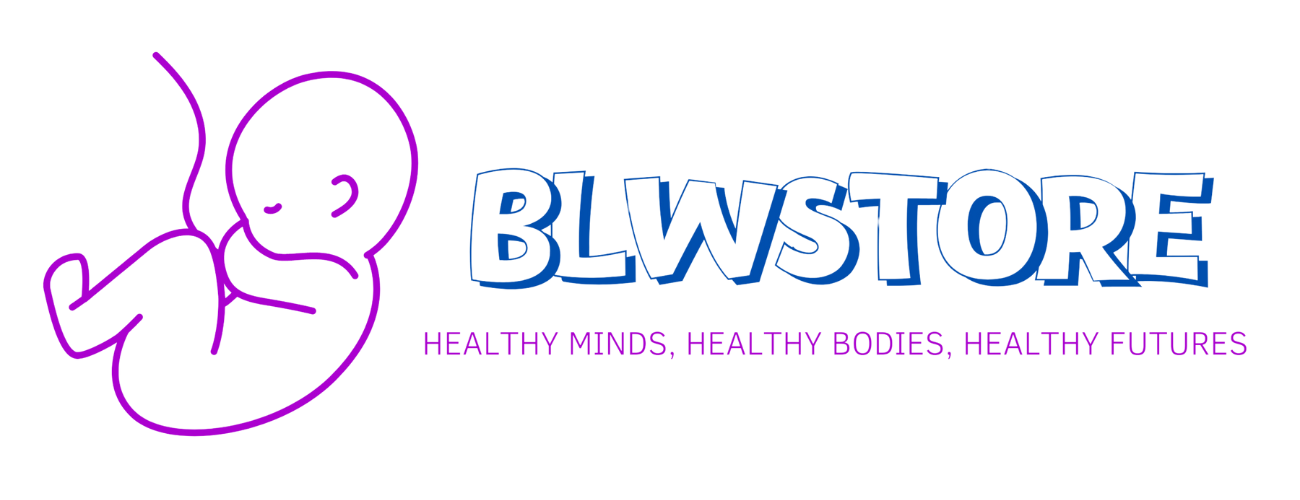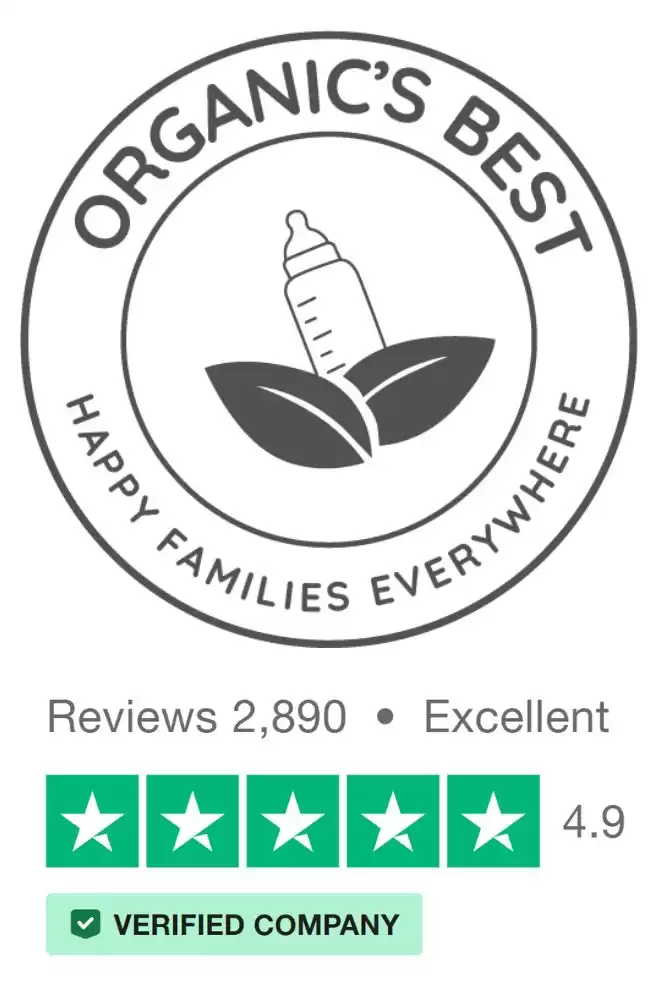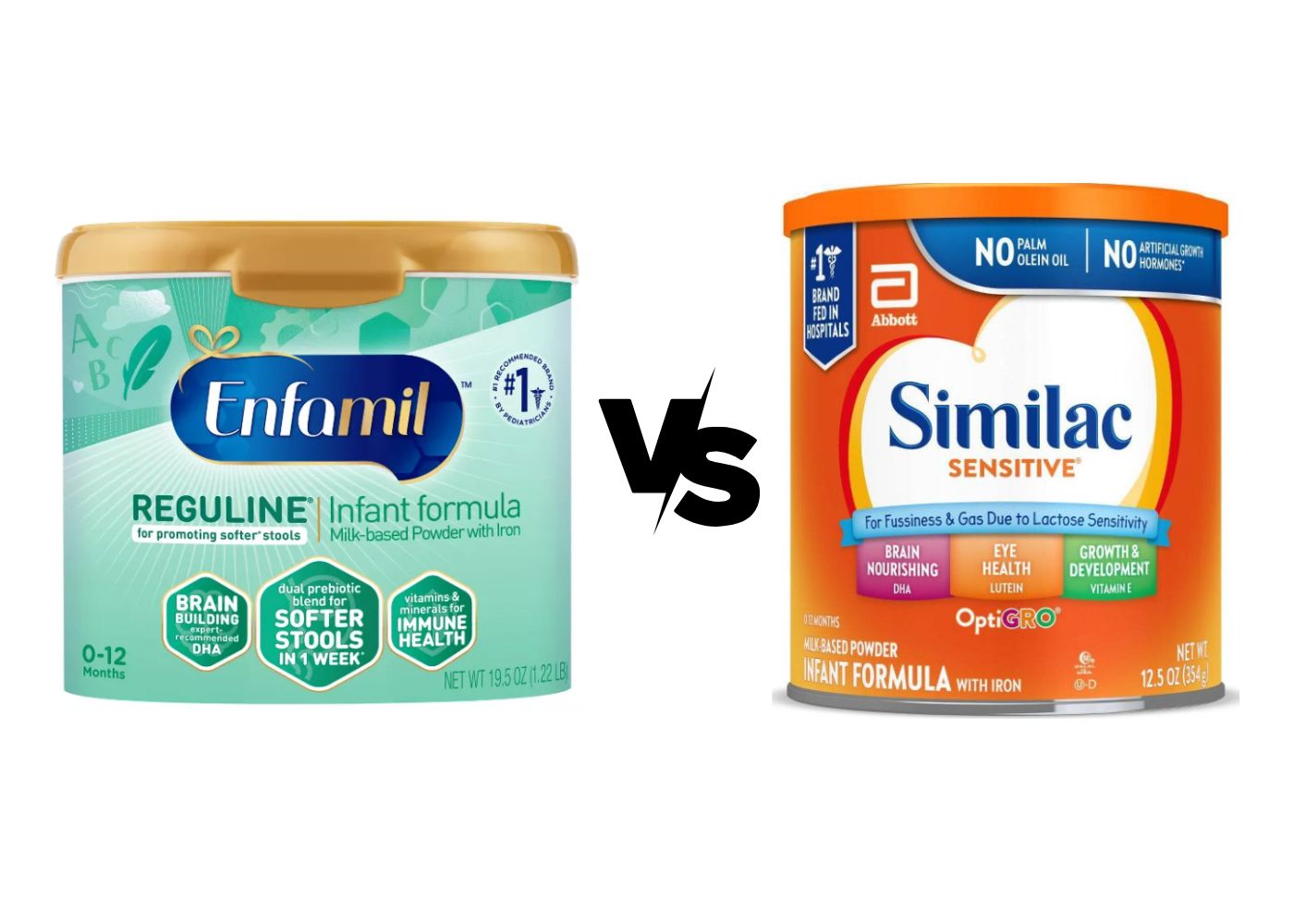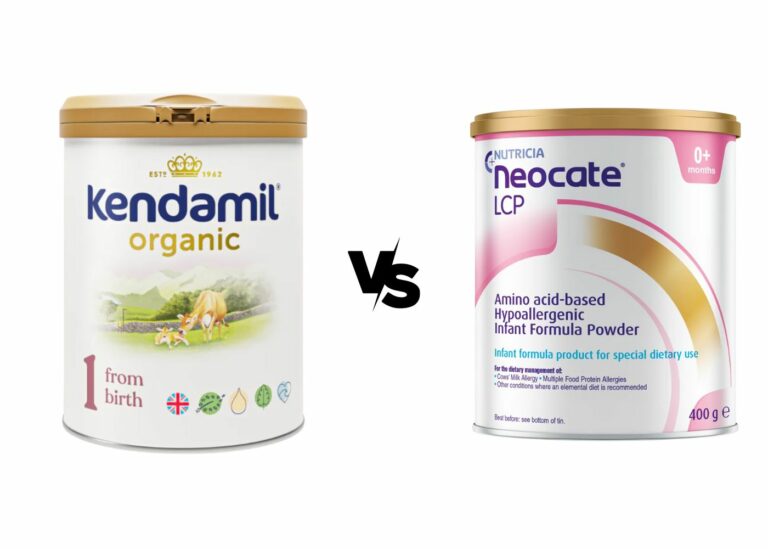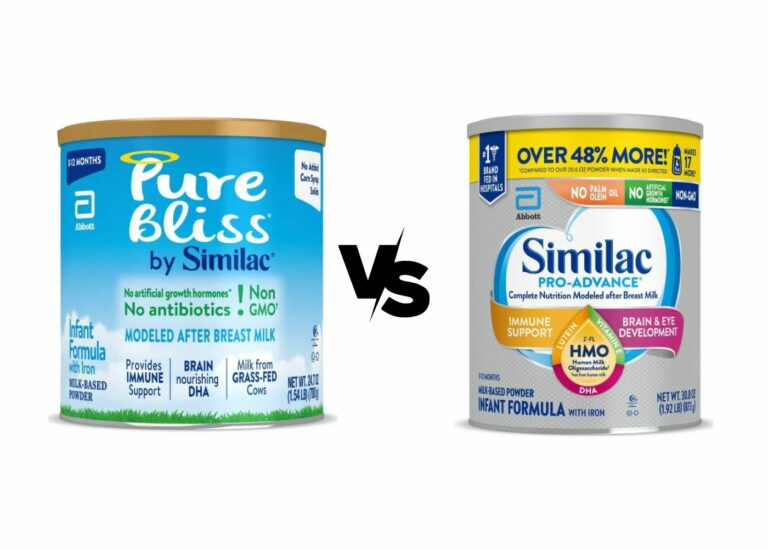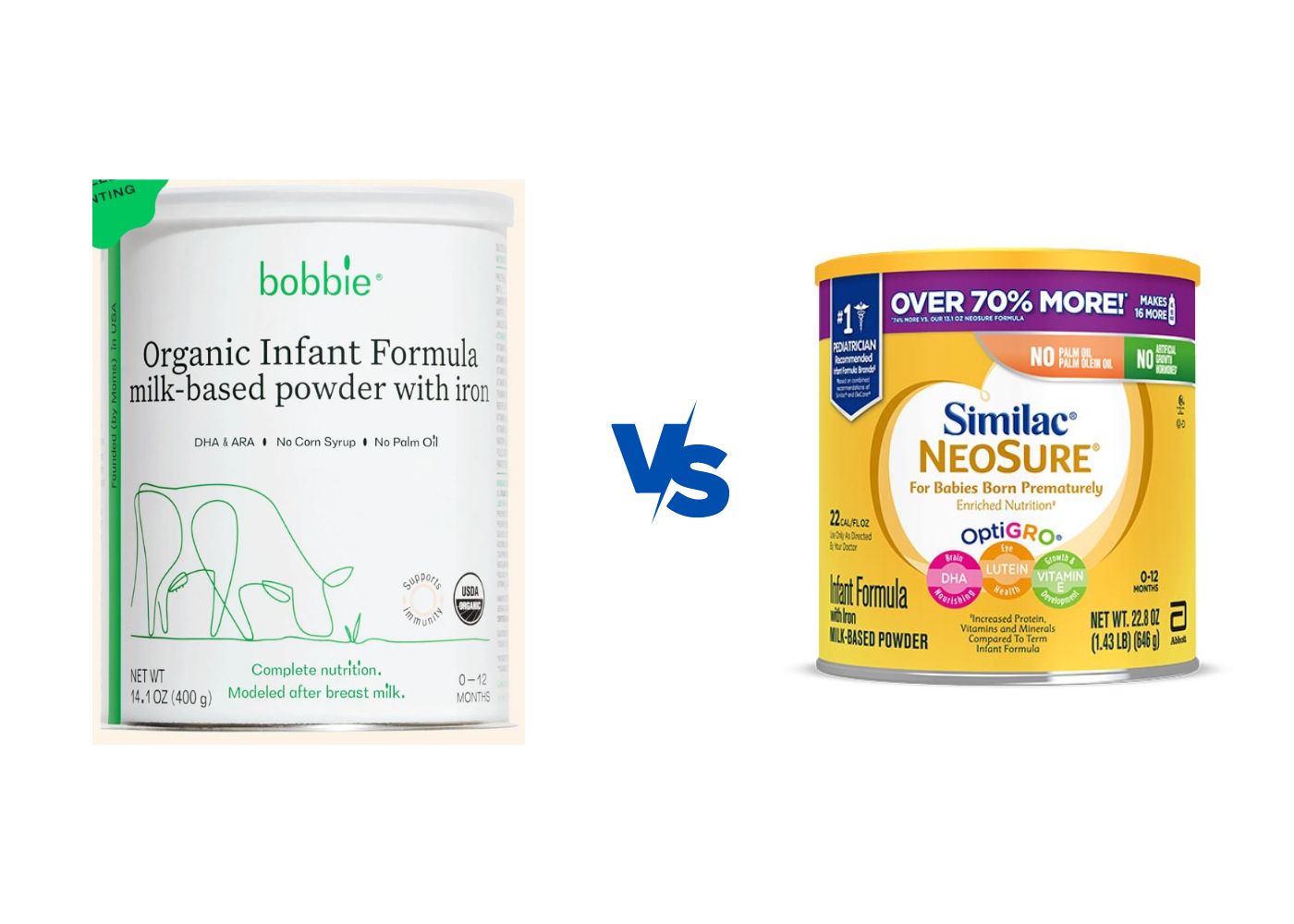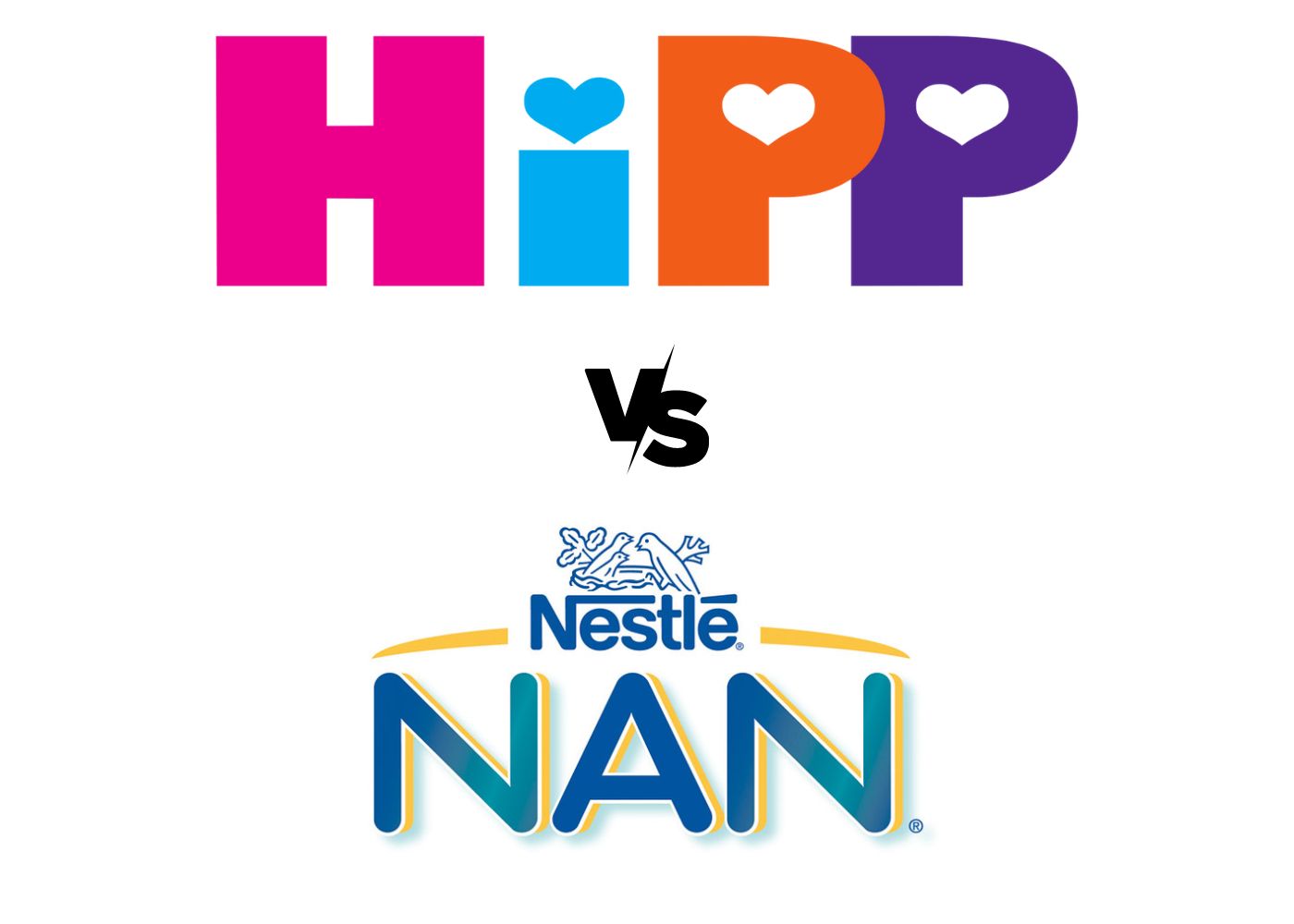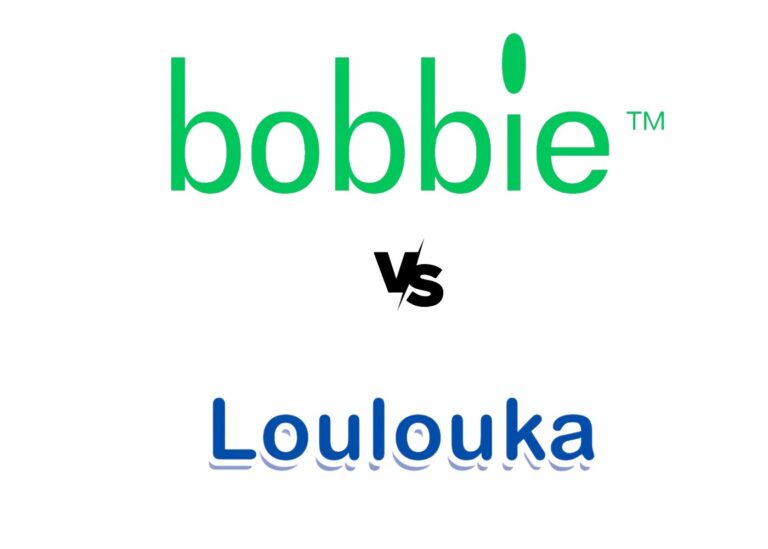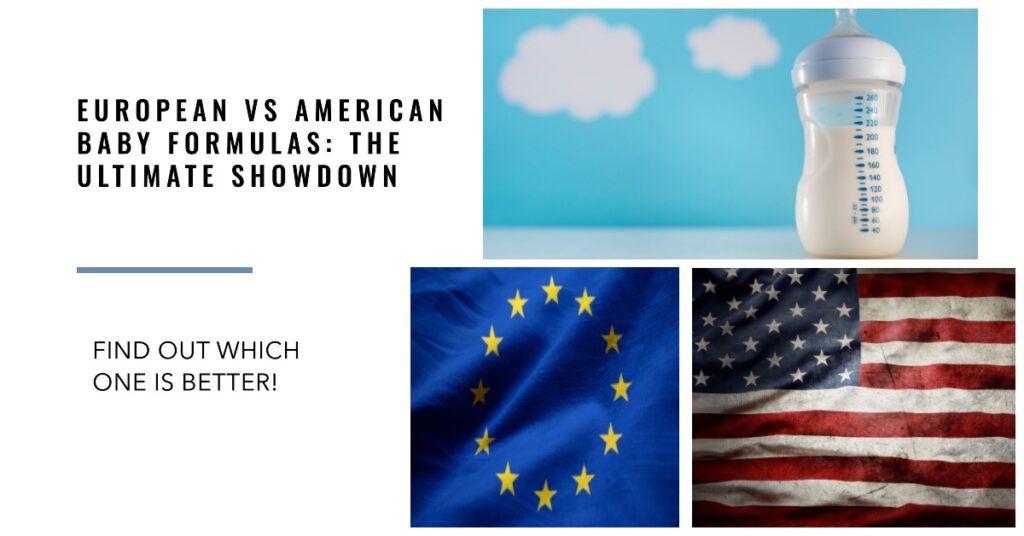
Key Takeaways. European and US Formulas at a Glance
| European Formula | US Formula |
|---|---|
| ✅ Stricter regulations and organic certifications | ?️egulated by the FDA |
| ❌ No added sugars like corn syrup solids | Some formulas contain corn syrup solids |
| Purer and healthier ingredients | May contain GMOs and synthetic nutrients |
| Mainly from grass-fed cows or goats | Nonfat cow’s milk or whey protein |
| Comprehensive organic certifications | Organic options available, but not as widespread |
| Importing makes prices higher in the US | More accessible and available to American parents |
Blwstore is supported by its audience. When you buy through links on our site, we may earn an affiliate commission.
This article aims to provide a comprehensive comparison between European and American baby formulas.
As we delve into the subject, it’s essential to remember that this comparison is broad, and doesn’t delve into specifics of individual brands. Every brand, whether European or American, offers a unique array of products, and these may vary significantly. Therefore, it’s crucial to conduct detailed research on different brands before settling on a final decision.
The choice between European and American baby formulas isn’t a matter of declaring one universally better than the other, but rather, it’s about finding the formula that best suits the specific needs of your baby.
Let’s get after it!
Related read: Best European Formulas
At BLWStore, we may earn a commission from some of the products featured on our website through affiliate partnerships with retailers. We want to be transparent with our readers and let you know that we do not receive any products for special consideration. The commission we earn helps support our website and allows us to continue providing helpful information and product recommendations. Thank you for your support!
Our Short Answer and Our Experience
We have an extensive background in infant nutrition and formula.
After inspecting the ingredients and their origins from over 40 European and American formulas, analyzing various regulations, and writing over 50 comparisons in our other articles, we can assert that, generally, European formulas tend to be healthier.
This is due to stricter European regulations and more rigorous standards for organic certifications. Additionally, European formulas do not typically include added sugars like corn syrup solids.
This is not to say that high-quality formulas do not exist in the United States – brands such as Earth’s Best and Bobbie (our favorite) exemplify this. However, overall, European formulas tend to have purer and healthier ingredients.
That being said, all commercial formulas available today provide a comprehensive nutrient composition, which should allow your baby to grow healthily. The critical factor is finding a formula that fits your baby’s specific needs.
We recommend exploring our posts about the best formulas with prebiotics and probiotics, formulas without added sugars, and hypoallergenic formulas.
With over 100,000 orders delivered globally since 2019, Organic's Best offers clean, safe, and nutritionally rich formulas and snacks.
Free shipping over $100, commitment to freshness and authenticity.
- Express delivery in 2 to 5 business days
- Sourcing from European manufacturers
- Minimum shelf life of 6 months
- Climate-Controlled Warehouse
Give your little one the best start.
CODE 'BLW' for a 5% discount in all orders
European Baby Formula: An Overview
European Infant Formula At A Glance
European baby formulas are applauded for their strict adherence to high-quality standards, including rigorous organic practices.
Leading brands such as Holle, Hipp, Kendamil, Lebenswert, Loulouka, Nannycare, and Kabrita offer unique formula characteristics, from prebiotics for gut health to goat milk formulas for easy digestion.
Key EU infant formula regulations highlight nutritional requirements, product development innovation, pesticide restrictions, mandatory nutrition declaration, and the addition of DHA.
Additionally, European formulas are known for their comprehensive organic certifications, such as the EU Organic, Demeter, Bioland, HiPP Organic Seal, German Organic Seal, and AB France Organic.
Ingredients in European formulas typically include lactose, organic milk from grass-fed cows, skim milk proteins, healthy fats, prebiotics, and probiotics, and are free of GMOs. Strict regulations on GMOs, sugar types, and synthetic nutrients ensure premium quality.
Pros include strict EU regulations, the majority being organic, more milk options from pasture-raised, grass-fed cows or goats, and the absence of GMOs, added sugars, and synthetic nutrients.
However, they may be difficult for American parents, availability may vary, and importing costs can be high.
What are the most popular European Baby Formula brands?
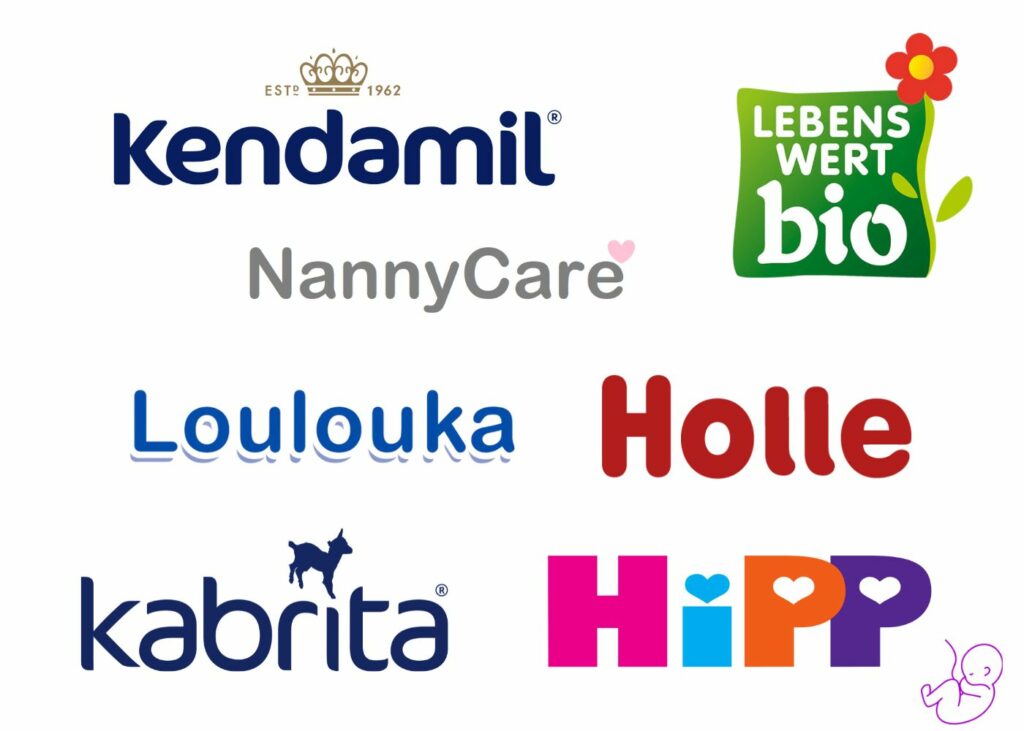
In the realm of European baby formulas, there are several notable brands that have garnered attention for their commitment to quality, nutrition, and organic practices.
Holle: Known for its Demeter certification, Holle takes pride in adhering to the strictest of organic standards. Their products are free from artificial additives and GMOs, with ingredients sourced from Demeter-certified farms, known for their sustainable and biodynamic farming practices.
Hipp: This brand stands out for its use of prebiotics and probiotics in their formulations, which are designed to support a baby’s gut health. They also offer a range of specialty formulas to cater to different dietary needs and preferences, such as hypoallergenic and comfort formulas.
Kendamil: Kendamil differentiates itself by using whole milk in their formulas – a rare practice in the industry. Additionally, their products contain Human Milk Oligosaccharides (HMOs), beneficial compounds naturally found in human breast milk that are known to boost immunity and aid digestion.
Lebenswert: For parents seeking an affordable yet organic option, Lebenswert is a standout choice. Despite its lower price point, the brand does not compromise on the purity of its organic practices, offering products free from synthetic fertilizers and chemical pesticides.
Loulouka: Made in Switzerland, Loulouka formulas feature organic cow’s milk sourced from Swiss farms. They are free from palm oil and contain essential fatty acids from coconut oil, which are crucial for a baby’s development.
Nannycare: Known for its spectacular goat milk formula, Nannycare offers a great alternative for babies who have trouble digesting cow’s milk. Their products are naturally easy to digest and are rich in essential nutrients.
Kabrita: Kabrita is another noteworthy brand that offers goat milk formulas. Their products are famous for being easily digestible and contain a balance of quality nutrients to support a child’s growth and development.
What are the EU Infant Formula Regulations?
The following are key points of the EU’s infant formula regulations:
Infant Formula as Essential Nutrition: Infant formula is recognized as the only processed foodstuff that wholly satisfies the nutritional requirements of infants during their first months of life until the introduction of appropriate complementary feeding. This makes it imperative that infant formula is the only product marketed as suitable for such use during that period.
Nutritional Requirements: The essential composition of infant formula and follow-on formula must satisfy the nutritional requirements of infants in good health, as established by generally accepted scientific data.
Detailed Requirements: Infant formulas and follow-on formulas are sophisticated products formulated for vulnerable consumers. The EU, therefore, has laid down detailed requirements on their composition, including energy value, macronutrient, and micronutrient content. These requirements are based on the latest scientific advice from the European Food Safety Authority.
Innovation and Product Development: Voluntary addition of ingredients not covered by specific requirements of the EU regulations is allowed, encouraging innovation and product development. However, the suitability of all ingredients for infants must be demonstrated, with food business operators bearing the responsibility of proving such suitability.
Pesticide Restrictions: The EU also has provisions restricting or prohibiting the use of pesticides and pesticide residues in infant formula and follow-on formula. These measures ensure that these products are in line with current scientific knowledge and that comprehensive evaluations by the Authorities are carried out for the safety of infants and young children.
Nutrition Declaration: A comprehensive nutrition declaration is mandatory for all infant formula and follow-on formula, regardless of package or container size. This nutrition declaration is essential to guarantee appropriate use and to provide complete information to parents, caregivers, and healthcare professionals who recommend their consumption.
Claims and Statements: Nutrition and health claims, though used as promotional tools, are not allowed for infant formula due to their particular role in the diet of infants. Statements relating to the presence or absence of lactose in infant formula and follow-on formula, however, can provide useful information to parents and caregivers.
Mandatory Addition of DHA: A new requirement introduced by the EU regulations is the mandatory addition of docosahexaenoic acid (DHA) to infant formula and follow-on formula. This was recommended by the Authority in its opinion on the essential composition of infant and follow-on formulae.
What are the organic certifications of EU formulas?
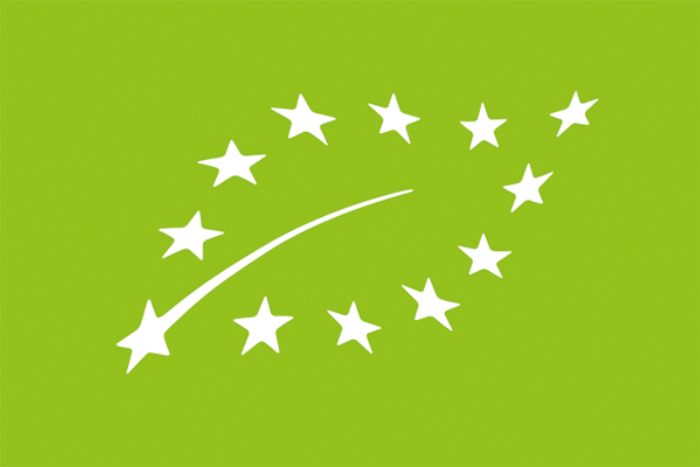
European Union Organic: The European Union Organic certification is a baseline standard for organic food products in the EU. To be certified, at least 95% of the agricultural ingredients in a product must be organic, and the remaining 5% must adhere to additional strict conditions set by the EU. The certification also emphasizes biodiversity protection, prohibition of GMOs and hormones, and restricted use of artificial fertilizers, herbicides, pesticides, and antibiotics.
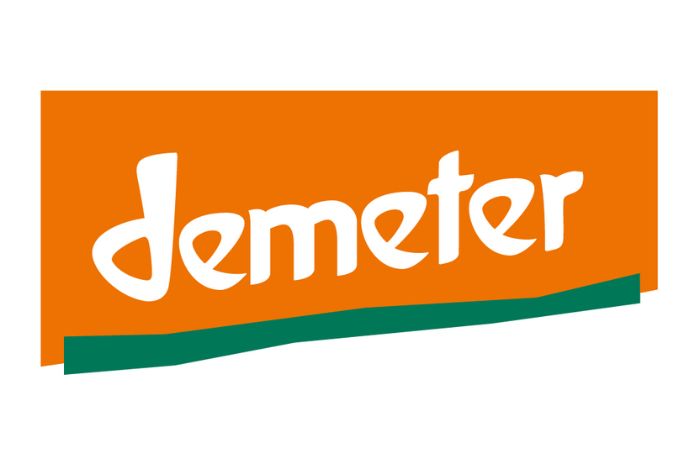
Demeter: Demeter is an association that brings biodynamic farming to the organic sector. It has been setting high standards for organic food production since 1924, surpassing EU organic regulations. Demeter certification emphasizes soil health, regeneration, diversified ecosystems, and GMO-free agriculture.
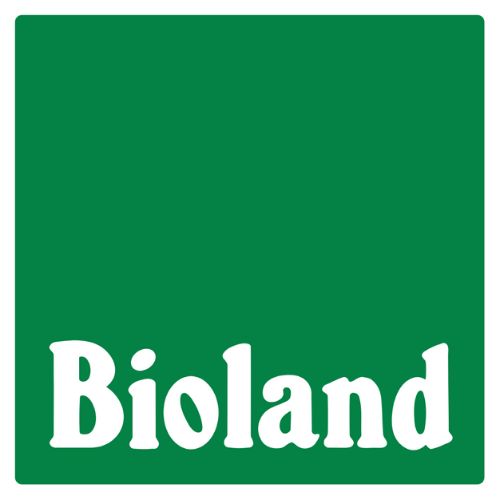
Bioland: Bioland is a federation of over 6200 companies dedicated to ecological farming in Germany. It has established seven principles of agriculture for the future, including animal welfare and limited use of nitrogen fertilizers and genetically modified seeds. All farms under Bioland must base their agricultural production on organic food.
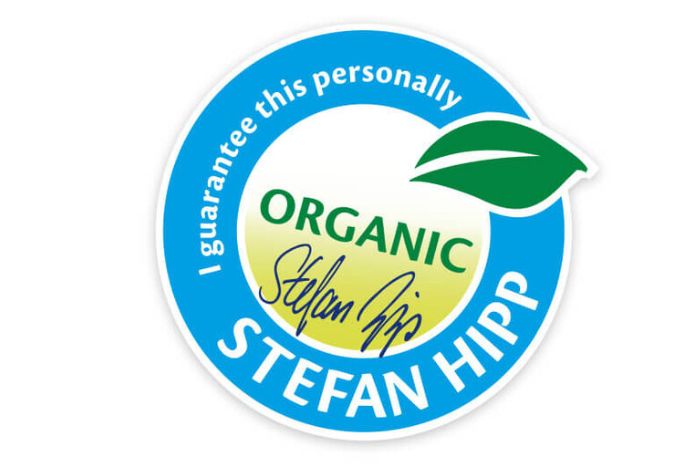
HiPP Organic Seal: HiPP, a leading baby formula brand in Europe, has its own organic seal that represents the highest standards of purity. Despite already holding the EU Organic logo, HiPP has implemented stricter guidelines to address potential contamination from air and soil pollutants.
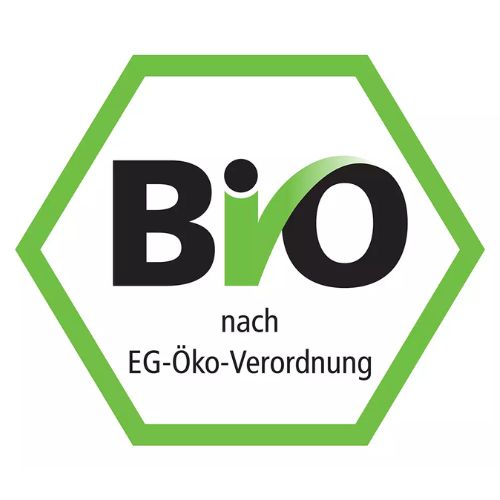
German Organic Seal: The German Organic Seal is combined with the EU Organic logo on qualifying products. It follows many guidelines as the EU Organic certification, ensuring that agricultural ingredients are a product of organic farming.
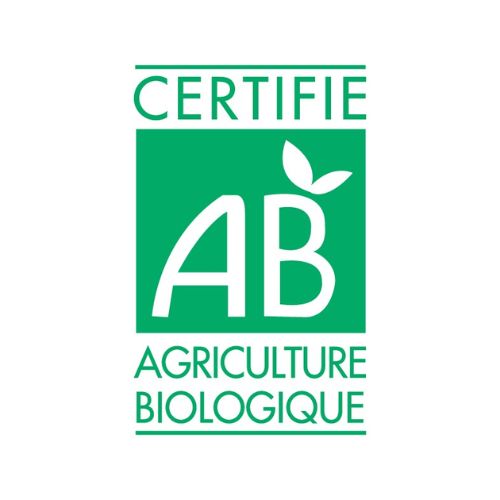
AB France Organic: AB is a private label based in France used in addition to the European organic logo on qualifying products. It follows strict guidelines that prioritize sustainability, respecting biodiversity, and preserving natural resources through the production of organic goods.
What are the common ingredients found in European baby formula?
As we said in the introduction, the following ingredients are a broad overview of the ingredients used in European Formulas, but they do not represent all individual brands:
Ingredients Commonly Found in EU Formulas  | Ingredients Not Commonly Found in EU Formulas  |
|---|---|
| Lactose as the primary carbohydrate | Plant-based sweeteners like corn syrup or sucrose |
| Organic milk from grass-fed cows | Added extras like carnitine, taurine, or nucleotides |
| Protein from skim milk, whey, or casein sources | Amino acid-based or extensively/completely hydrolyzed protein |
| Healthy fats such as vegetable oils or fish oil | Synthetic nutrients like lutein or lycopene |
| Prebiotics and probiotics for gut health | Artificial flavors or colors |
| Strict organic certifications | Ingredients derived from GMOs |
Use Of GMOs, Sugar Types, And Synthetic Nutrients In EU Formulas
European baby formulas are known for their strict regulations on the use of GMOs, sugar types, and synthetic nutrients. Unlike American formulas that may contain corn syrup or other sweeteners, European regulations prohibit excessive sugar in formula as it can lead to obesity and other health problems.
Additionally, organic baby formulas in Europe cannot contain any synthetic nutrients. These regulations ensure that European baby formulas are made with only high-quality ingredients that provide essential nutrition for babies without any potential harmful additives.
Pros And Cons Of European Baby Formulas
Pros  | Cons  |
|---|---|
| Strict European Union regulations ensure high-quality ingredients and manufacturing processes. | European baby formulas are not regulated by the FDA and are illegal to sell in the US, making them difficult to access for American parents. |
| Most European baby formulas are organic, ensuring fewer chemicals and pesticides are present in the ingredients. | Availability and accessibility of specific European baby formula brands may vary, making it challenging for parents to consistently purchase their preferred formula. |
| European baby formulas often have more options for milk sourced from pasture-raised, grass-fed cows or goats, leading to a perception of higher quality dairy products. | Importing European baby formulas can be expensive due to shipping costs and potential import duties. |
| Most European baby formulas are free of GMOs, added sugars, and synthetic nutrients, which can be appealing to health-conscious parents. |
American Baby Formula: An Overview
American Infant Formula At A Glance
American baby formulas are regulated by brands such as Enfamil, Similac, Gerber Good Start, Earth’s Best, Happy Baby, and Bobbie, all offering diverse and specialized product lines.
The FDA provides stringent guidelines on labeling, nutrient quality, food additives, and quality control.
Organic-certified formulas adhere to certifications like USDA Organic, Non-GMO Project Verified, Certified Naturally Grown, QAI, and Oregon Tilth Certified Organic.
Ingredients in US formulas typically include lactose, nonfat cow’s milk or whey protein, vegetable oils, synthetic nutrients, prebiotics, or probiotics, and are fortified with vitamins and minerals.
Some formulas may contain GMOs, corn syrup solids, and synthetic nutrients.
What are the most popular American Baby Formula brands?
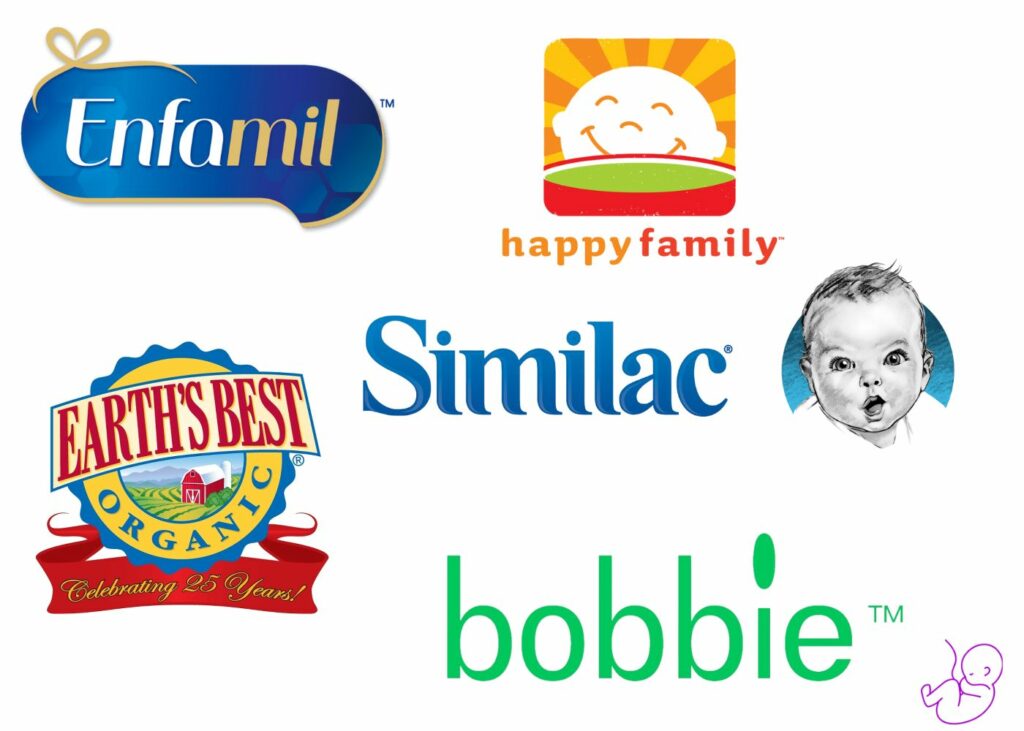
Enfamil: Enfamil is one of America’s most widely recognized baby formula brands. They offer a diverse range of products to cater to varying infant needs, including specialized formulas for preemies and options designed for babies with digestive issues or allergies.
Similac: Another leading brand, Similac is praised for its advanced formulas that include OptiGRO, an exclusive blend of DHA, Lutein, and Vitamin E, designed to support brain and eye development.
Gerber Good Start: Gerber, a brand synonymous with baby food, also offers a line of infant formulas known as Gerber Good Start. These formulas are designed to be gentle on a baby’s tummy and are made with probiotics.
Earth’s Best: Known for its commitment to organic ingredients, Earth’s Best offers a range of organic infant formulas. Their products are non-GMO and free from artificial flavors, colors, and preservatives, adhering to the USDA’s standards for organic certification.
Happy Baby: This brand stands out for incorporating prebiotics and probiotics in their formulas, which support a healthy gut microbiome in infants. Happy Baby’s products are also USDA-certified organic and non-GMO, ensuring a clean, high-quality formula for babies.
- Bobbie: Bobbie Baby Formula, an American brand, offers a European-inspired organic formula made from grass-fed, pasture-raised cows’ milk. The formula is designed to mimic breast milk and is available through subscription or at Target. However, it’s pricier than generic brands and not sold in grocery stores or pharmacies
What are the FDA regulations?
Who is Responsible?
- Companies that make or distribute baby formula in the U.S. must follow certain laws and rules.
Guidance from FDA:
- The FDA provides advice on various topics, including how to label baby formula and how to ensure the protein in the formula is of good quality. They also advise on what to do if there is a need to recall a certain formula.
Rules and Regulations:
- The FDA has rules on several topics, like adding certain levels of selenium (an essential mineral) to baby formula and how to manage the quality of the formula. They also regulate the use of certain food additives.
Quality Control and Manufacturing:
- Companies need to follow specific regulations to ensure the quality of baby formula. This includes keeping detailed records, labeling properly, meeting nutrient requirements, and having a plan in case a formula needs to be recalled.
Export Only Formulas:
- There are specific rules for baby formula products that are only for export.
Clinical Studies:
- If clinical studies are conducted on baby formulas, they must follow rules to protect the people involved in the studies.
What are the organic certifications of US formulas?
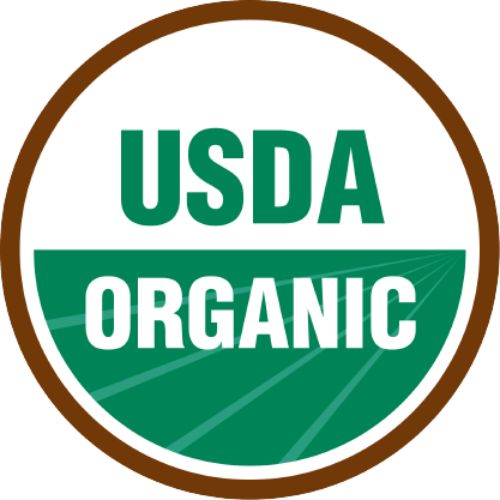
USDA Organic: This is probably the most well-known certification in the U.S. It’s regulated by the United States Department of Agriculture (USDA) and its National Organic Program (NOP). Products labeled as “100% organic” must contain only organically produced ingredients. Those labeled as “organic” must contain at least 95% organic ingredients.
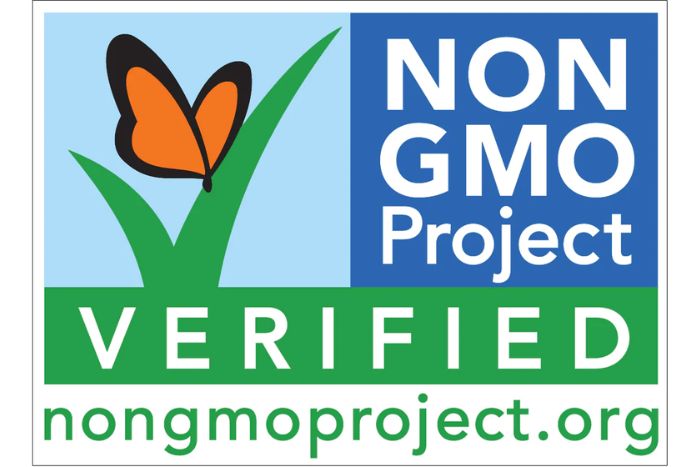
Non-GMO Project Verified: While not an organic certification per se, this label indicates that a product does not contain genetically modified organisms (GMOs). Many consumers consider this certification in conjunction with organic certifications. Organic standards by the USDA already prohibit the use of GMOs, but the Non-GMO Project offers additional third-party verification.
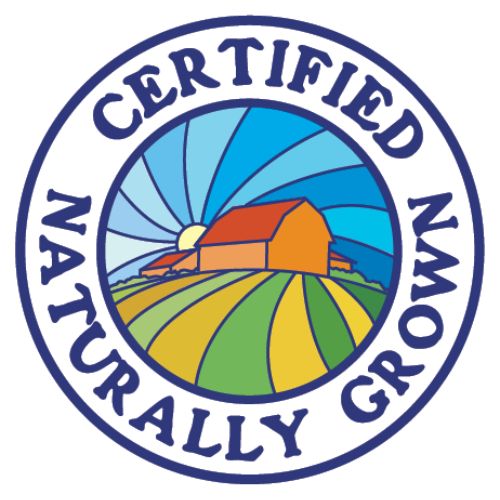
Certified Naturally Grown (CNG): This certification is intended for small-scale producers who might find the USDA certification process too cumbersome or expensive. CNG standards are based on the USDA organic standards but with some differences, including a greater emphasis on direct relationships between farmers and consumers and a peer-review inspection process.
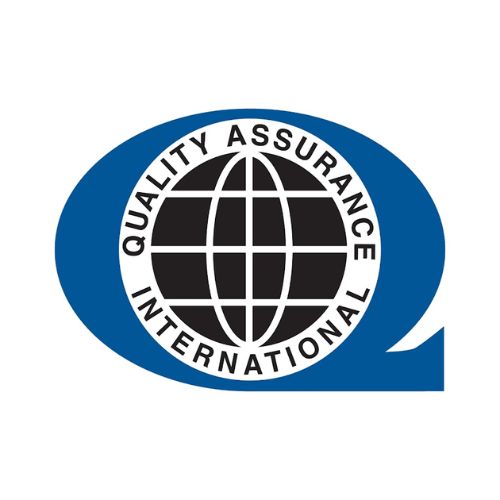
QAI (Quality Assurance International): QAI is a USDA-accredited certifying body that offers organic certification services for a wide range of industries, including crop production, food manufacturing, personal care products, dietary supplements, and more.
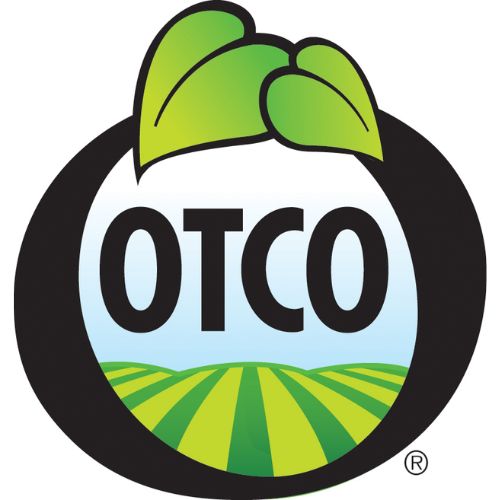
Oregon Tilth Certified Organic (OTCO): Oregon Tilth is another USDA-accredited certifying body. It offers certifications for crops, livestock, processed products, and more. Its standards are largely similar to the USDA’s.
What are the common ingredients found in American baby formula?
Commonly Found Ingredients in US Formulas  | Ingredients Not Found in US Formulas  |
|---|---|
| Lactose | Some sugar types, like maltodextrin, are less common in US formulas compared to European formulas |
| Nonfat cow’s milk and/or whey protein | Goat’s milk is less commonly used in American formulas |
| Vegetable oils (palm, soybean, sunflower, etc.) | Some European formulas use milk fat globule membrane (MFGM) as a fat source, which is not as common in US formulas |
| Synthetic nutrients (L-carnitine, taurine, etc.) | European formulas may use non-synthetic nutrients, while US formulas typically include synthetic nutrients |
| Prebiotics and/or probiotics | Some specific prebiotic and probiotic strains may not be found in American formulas |
| Fortified with vitamins and minerals (Vitamin D, iron, etc.) | Some European formulas may have higher levels of certain nutrients not typically found at the same levels in US formulas |
| May contain soy protein | Most American formulas do not contain GMOs, similarly to European formulas |
Use Of GMOs, Sugar Types, And Synthetic Nutrients In US Formulas
Some american baby formulas contain GMOs, which are genetically modified organisms.
In addition, American formula manufacturers commonly use corn syrup solids and other types of sugar as sweeteners in their products, which is not inherently bad in the case of specialty formulas without lactose, but other formulas contain them.
Synthetic nutrients are sometimes added to US formulas to replace naturally sourced vitamins and minerals.
Pros And Cons Of American Baby Formulas
Pros  | Cons  |
|---|---|
| Regulated by the FDA, ensuring minimum nutritional and safety requirements | Some formulas contain genetically modified organisms (GMOs) |
| Provides parents with peace of mind knowing their infant is receiving a tested and authorized formula | Synthetic nutrients are used in some formulas |
| Offers more options for sourcing milk from pasture-fed cows | Use of corn syrup solids as a sweetener is common, linked to obesity and tooth decay |
| Organic options available for those concerned with hormone or antibiotic use in dairy farming |
FAQs. European vs US Infant Formulas
1. What are the main differences between European and American baby formula?
The main difference between European and American baby formula is that European formulas tend to have stricter regulations when it comes to ingredient quality and nutritional content. This means that European formulas may contain fewer artificial additives or preservatives, as well as higher amounts of vitamins and minerals.
2. Is one type of baby formula safer than the other?
Both European and American baby formulas are generally considered safe for infants, but there may be slight variations in safety standards depending on where they were manufactured. It’s important to carefully research any formula you plan to use, regardless of its origin, to ensure that it meets your infant’s specific needs.
3. Are there cultural differences in how babies are fed in Europe versus America?
There are some cultural differences when it comes to feeding babies in Europe versus America, including attitudes towards breastfeeding and the timing of introducing solid foods. However, these factors do not necessarily correspond directly with the types of baby formula available in each region.
4. How can I decide which type of baby formula is best for my child?
The best way to determine which type of baby formula is best for your child depends on a variety of factors such as their age, nutritional needs, existing health conditions, allergies, or intolerances you may need to take into account before deciding which brand or style will work best. You can consult a pediatrician or registered dietitian who can provide guidance based on your infant’s individual situation.
Last Words
If you have made it to the end, thank you very much!
We hope this comparison between European and American formulas will help you to have a broader perspective and make more informed decisions.
See you around!
We’re Maria and Alberto, a married couple and educators who are nutrition enthusiasts. Even before we had kids, we were already crazy about nutrition.
We’d read scientific articles, watch videos from nutritionists, and spend hours listening to nutrition podcasts.
Today, we continue doing this, but in a different way, as we’ve learned to sift through the noise and trends. Nutrition, like any other field of knowledge, the more you read and learn, the more you develop a comprehensive understanding of reality, and that’s what has happened to us.
Before having our first child, we focused on learning everything we could about child nutrition, using the same techniques we had already employed, backed by our extensive knowledge in nutrition.
Our mission is to help other parents with their children’s nutrition, to help them become the best versions of themselves.
If we are what we eat and drink, which is absolutely true, let’s do it right!
